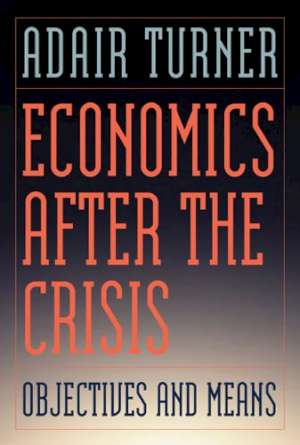24 April 2013
Economics After the Crisis: Ojbectives and Means
Adair Turner
2012, MIT Press, 128 pages, £17.95
ISBN 9780262017442
Reviewer: Bill Allen, Formerly Deputy Director, Bank of England

Adair Turner has written a rather joyless book about the pursuit of happiness. He believes that, in rich countries, income yields diminishing returns in happiness as it increases. This is partly because people are concerned about their incomes relative to others’, as well as their absolute incomes, and partly because the most basic and pressing human needs have been met. He draws three conclusions: first, that economic policy should no longer be directed at maximising long-term GDP growth; second, that inequality matters a lot to human happiness; and third, that free markets are not a universally applicable means of achieving faster growth.
The diagnosis is unconvincing. Lord Turner’s observations about the relationship between income and happiness are based on surveys in which people are asked how happy they are. Their answers to survey questions are unlikely to be based on profound reflection on their condition. When, in 1805, Wordsworth wrote “Bliss was it in that dawn to be alive/But to be young was very heaven!” average life expectancy was only around 40 years; but that dismal fact did not alloy the rapture that he described. It does not follow that all the material progress that has been achieved since 1805 is worthless.
Just as the diagnosis is unconvincing, so is the first conclusion. Who says our economic policies are directed at maximising long-term GDP growth? If they are, why do we have redistributive taxation, planning laws, and the National Health Service? In fact, economic policy is decided by politicians who, fortified by their democratic mandates, constantly decide what weight to attach to economic growth and what weights to other concerns in making decisions.
What about inequality? Quite possibly Lord Turner is right in saying that inequality causes unhappiness, but what is to be done about it? He believes, quite rightly in my view, that economic freedom should be regarded as an end in itself and not simply as an instrument that governments can use to deliver ‘happiness’ to the electorate. Economic freedom has consequences. One of them is economic growth, which Lord Turner regards as ‘acceptable’. Another, as he acknowledges, is inequality. Reducing inequality has a cost in economic freedom, since it means, for example, higher taxes. Is he advocating higher taxes? He hints that he is, but leaves that decision to politicians.
Lord Turner’s belief in economic freedom does not extend to financial markets. He thinks that, “Policy should be heavily focused on ensuring macroeconomic and financial stability and very wary of financial innovation if it carries with it any risk of increased instability.” That sounds extremely restrictive. It is of course written in the aftermath of the financial crisis, and harks back to the supposedly golden age of stability in the 1950s and 1960s. That era was marked by cartelised banking and endemic indifference to customers, as well as financial stability. Does he really want to go back to that? If not, how could he avoid it? Nor is it to be assumed that government officials will succeed in achieving financial stability, as students of the Euro sovereign debt crisis will appreciate.
Lord Turner thinks that “the discipline of economics” is to blame. Certainly, some economists have been proved badly wrong. But no one looking back at the recent crisis could say, for example, that Joseph Schumpeter had been discredited. Perhaps the one thing that is clear is that economic history is more important than people imagined, though Lord Turner doesn’t draw that conclusion. In sum, it seems that if Lord Turner is arguing for any policy change, it is a marginal shift towards more redistribution, and a large shift towards more financial regulation, at the possible cost of some growth. It’s a point of view, but not a revolution in economic thought.
